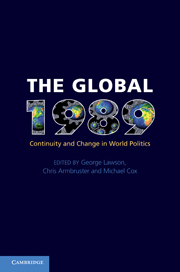Book contents
- Frontmatter
- Contents
- List of figures
- List of tables
- Notes on contributors
- Acknowledgements
- List of abbreviations
- Introduction: the ‘what’, ‘when’ and ‘where’ of the global 1989
- Part I What and when
- 1 Back to the future of nineteenth-century Western international thought?
- 2 The return of primitive accumulation
- 3 What is left after 1989?
- Part II Where
- Part III Continuity and change
- Conclusion: was there a global 1989?
- Bibliography
- Index
1 - Back to the future of nineteenth-century Western international thought?
Published online by Cambridge University Press: 05 June 2012
- Frontmatter
- Contents
- List of figures
- List of tables
- Notes on contributors
- Acknowledgements
- List of abbreviations
- Introduction: the ‘what’, ‘when’ and ‘where’ of the global 1989
- Part I What and when
- 1 Back to the future of nineteenth-century Western international thought?
- 2 The return of primitive accumulation
- 3 What is left after 1989?
- Part II Where
- Part III Continuity and change
- Conclusion: was there a global 1989?
- Bibliography
- Index
Summary
The postmodern [European] state … needs to get used to the idea of double standards. Among themselves, the postmodern states operate on the basis of laws and open co-operative security. But when dealing with more old-fashioned kinds of state outside the [Western] post-modern limits, Europeans need to revert to the rougher methods of an earlier era – force, preemptive attack, deception, whatever is necessary for those who still live in the nineteenth-century world of every state for itself. In the jungle, one must use the laws of the jungle.
Robert Cooper (2004: 61–2)To suppose that the same international customs, and the same rules of international morality, can obtain between one civilized nation and another, and between civilized nations and barbarians, is a grave error … In the first place, the rules of ordinary international morality imply reciprocity. But barbarians will not reciprocate. They cannot be depended on for observing any rules … In the next place, nations which are still barbarous have not got beyond the period during which it is likely to be for their benefit that they should be conquered and held in subjection by foreigners.
John Stuart Mill (1859/1984: 118)Some Americans have promoted multiculturalism at home; some have promoted universalism abroad; and some have done both … A multicultural America is impossible because a non-Western America is not American. A multicultural world is unavoidable because global empire is impossible. The preservation of the United States and the West requires the renewal of Western identity.
Samuel Huntington (1996: 318)- Type
- Chapter
- Information
- The Global 1989Continuity and Change in World Politics, pp. 23 - 50Publisher: Cambridge University PressPrint publication year: 2010
- 3
- Cited by



